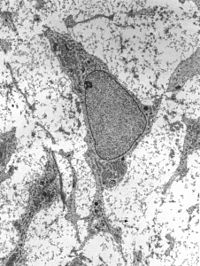
Photo from wikipedia
Stem cell therapy has been recognized as a promising approach for myocardium regeneration post myocardial infarction (MI); however, it unfortunately often remains a challenge because of poor survival of transplanted… Click to show full abstract
Stem cell therapy has been recognized as a promising approach for myocardium regeneration post myocardial infarction (MI); however, it unfortunately often remains a challenge because of poor survival of transplanted cells and a lack of clear understanding of their interactions with host cells. High oxidative stress at heart tissues post MI is considered one of the important factors damaging transplanted cells and native cells/tissues. Here, we employed an in vitro co-culture system, capable of mimicking cases of stem cell transplantation into the myocardium presenting high oxidative stress, using human mesenchymal stem cells (hMSCs) encapsulated in alginate or cell interactive Arg-Gly-Asp (RGD) peptide-modified alginate micro-hydrogels. Under H2O2-induced oxidative stress conditions, viabilities of hMSCs and CMs were significantly higher in their co-culture than in their individual monolayer cultures. Expression of cardiac muscle markers remained high even with H2O2 treatment when cardiomyocytes (CMs) were co-cultured with hMSCs in RGD-alginate. Higher levels of various growth factors (associated with angiogenesis, cardiac regeneration, and contractility) were found in co-culture (noticeably with RGD-alginate) compared to monolayer cultures of CMs or hMSCs. These results can benefit the study of in vivo MI progression with transplanted stem cells and the development of effective stem cell-based therapeutic strategies for various oxidative stress-related diseases.
Journal Title: International journal of biological macromolecules
Year Published: 2019
Link to full text (if available)
Share on Social Media: Sign Up to like & get
recommendations!